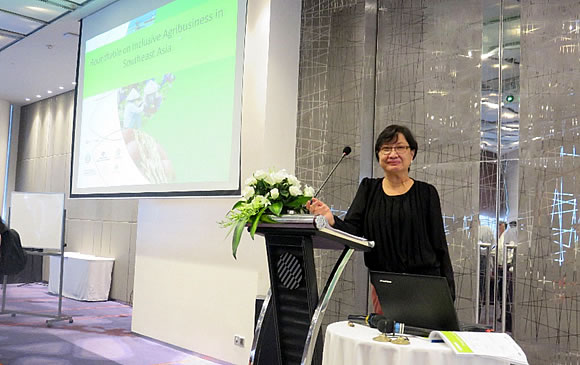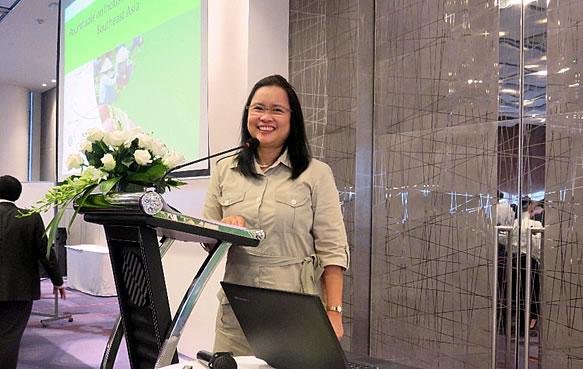 SEARCA, through Dr. Nerlie Manalili, presented the results of the scoping study on the landscape of inclusive agribusiness in Southeast Asia with emphasis on the status, trends, functions, shape and factors supporting success of inclusive agribusiness in the region focusing on Indonesia, Philippines, Myanmar and Vietnam. SEARCA shared the session on “Comparing Country Context” with Dr. Paul Teng of the Nanyang Technological University who introduced a framework for analyzing the enablers of inclusive agribusiness which come in multiple dimensions and at different scales. These two presentations set the stage for the subsequent concurrent country sessions.
SEARCA, through Dr. Nerlie Manalili, presented the results of the scoping study on the landscape of inclusive agribusiness in Southeast Asia with emphasis on the status, trends, functions, shape and factors supporting success of inclusive agribusiness in the region focusing on Indonesia, Philippines, Myanmar and Vietnam. SEARCA shared the session on “Comparing Country Context” with Dr. Paul Teng of the Nanyang Technological University who introduced a framework for analyzing the enablers of inclusive agribusiness which come in multiple dimensions and at different scales. These two presentations set the stage for the subsequent concurrent country sessions.
The discussions and sharing of successes, lessons learned, challenges and opportunities for sustainable agricultural growth revolved around the following themes: viable inclusive business  models, delivering impact at scale, integrating women in inclusive business, financing smallholders and inclusive agribusiness in the region, and policy innovation for inclusive agribusiness at scale. Towards the end of the Roundtable, priority action points were identified in terms of (1) making farmers’ voices be heard; (2) collecting evidences, monitoring and evaluation; (3) SME enterprise engagement; (4) public-private partnership models; (5) inclusiveness metrics; (6) value chain financing; (7) trade implications; (8) case studies; (9) policy research; and (10) community of practice.
models, delivering impact at scale, integrating women in inclusive business, financing smallholders and inclusive agribusiness in the region, and policy innovation for inclusive agribusiness at scale. Towards the end of the Roundtable, priority action points were identified in terms of (1) making farmers’ voices be heard; (2) collecting evidences, monitoring and evaluation; (3) SME enterprise engagement; (4) public-private partnership models; (5) inclusiveness metrics; (6) value chain financing; (7) trade implications; (8) case studies; (9) policy research; and (10) community of practice.
Inclusive agribusiness is one of the strategic thrusts of SEARCA under its 10th Five-Year Plan with the focal theme Inclusive and Sustainable Agricultural and Rural Development (ISARD). (Bessie M. Burgos)
![Panel Discussion on [i]Inclusive Business in Asia[/i] – (from left to right) Ganesan Ampalayanar of Nestle Vietnam, Tim Bishop of CARE International, H.E. Cao Duc Phat, Minister of Agricultural and Rural Development, Vietnam, Paul Teng of Nanyang Technological University and Ms. Kavita Prakash–Manil (far-right), Executive Director of Grow Asia.](/images/stories/news2015/sep/searca-supports-inclusive-agribusiness-initiatives-in-southeast-asia.jpg)